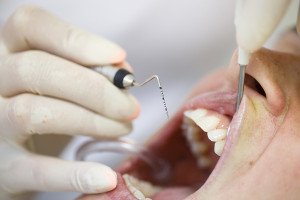Periodontal What?!?
 When you hear the words periodontal disease, it paints a vivid picture in your mind. The word disease in itself causes people to shudder and hope that they never have to face it head on. In order to keep your body healthy, you must remember to keep your teeth healthy as well.
When you hear the words periodontal disease, it paints a vivid picture in your mind. The word disease in itself causes people to shudder and hope that they never have to face it head on. In order to keep your body healthy, you must remember to keep your teeth healthy as well.
Periodontal disease, also called gum disease, is more common than you might imagine. It happens when the regular bacteria in your mouth begin to band together and form a sticky plaque on your teeth. With regular flossing and brushing, the plaque gets removed. But when you neglect to take care of your teeth, the plaque becomes tartar, which hardens to the teeth and can no longer be removed by brushing and flossing alone. The longer plaque and tartar sit on your teeth, the more susceptible you will become to periodontal disease.
Other risk factors for getting a gum disease include:
• Smoking
• Hormonal Changes
• Medications
• Diabetes
• Illness
• Heredity
• Decreased Immunity
There are two major types of gum disease including gingivitis and periodontitis.
• Gingivitis is a minor form of periodontal disease that causes irritation and bleeding of the gums at the base of your teeth.
• Periodontitis is an advanced form of gingivitis that actually cause the gums to pull away from the teeth, creating spaces where bacteria can dwell and begin to infect your mouth and body. When this happens, it can lead to tooth, bone, and tissue loss.
When left untreated, periodontal disease can cause illness that go beyond the mouth. Some studies show that people can develop the following problems that can be can be linked to gum disease:
• Heart Disease
• Stroke
• Asthma
• Rheumatoid Arthritis
• Respiratory Issues
How To Prevent It
The best thing you can do to prevent periodontal disease is to brush and floss your teeth at least twice a day. You might even brush after meals and snacks as well to prevent particles from becoming lodged in your teeth and harboring bacteria.
Equally as important is to be sure that you see a dental hygienist for a proper cleaning every six to 12 months. Only a professional cleaning can remove the tartar buildup on your teeth that can lead to gum disease. Your hygienist can also keep an eye on your gums and teeth to be aware of any changes. If you can discover periodontal disease early enough, you can get on top of it before it gets worse.